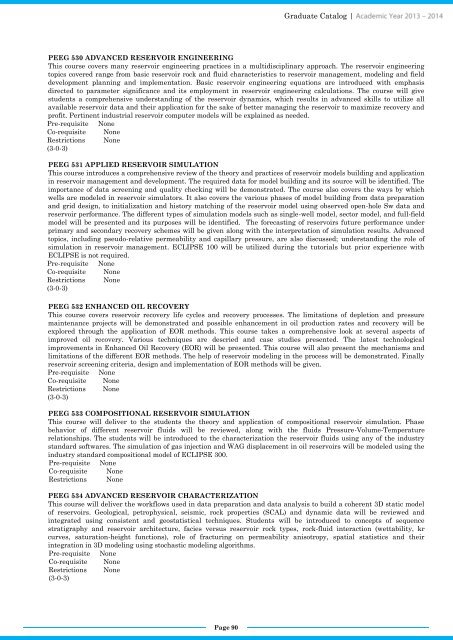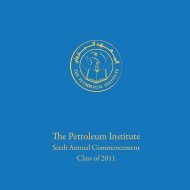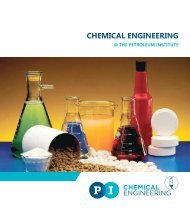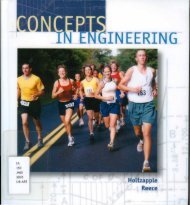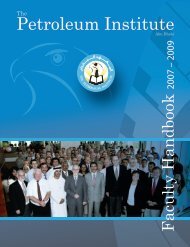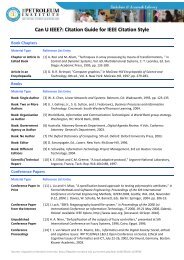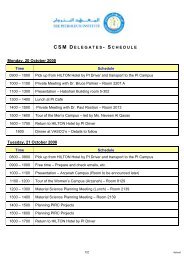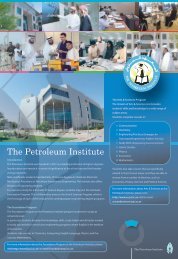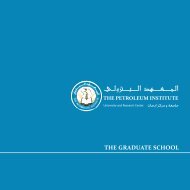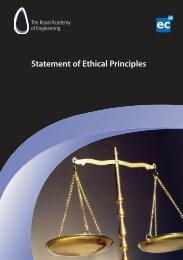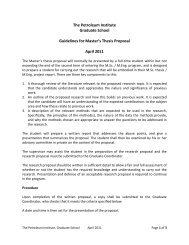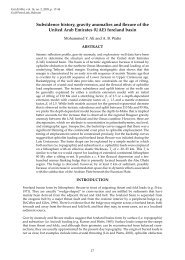GRADUATE CATALOG - The Petroleum Institute
GRADUATE CATALOG - The Petroleum Institute
GRADUATE CATALOG - The Petroleum Institute
- No tags were found...
You also want an ePaper? Increase the reach of your titles
YUMPU automatically turns print PDFs into web optimized ePapers that Google loves.
Graduate Catalog |PEEG 530 ADVANCED RESERVOIR ENGINEERINGThis course covers many reservoir engineering practices in a multidisciplinary approach. <strong>The</strong> reservoir engineeringtopics covered range from basic reservoir rock and fluid characteristics to reservoir management, modeling and fielddevelopment planning and implementation. Basic reservoir engineering equations are introduced with emphasisdirected to parameter significance and its employment in reservoir engineering calculations. <strong>The</strong> course will givestudents a comprehensive understanding of the reservoir dynamics, which results in advanced skills to utilize allavailable reservoir data and their application for the sake of better managing the reservoir to maximize recovery andprofit. Pertinent industrial reservoir computer models will be explained as needed.Pre-requisite NoneCo-requisite NoneRestrictions None(3-0-3)PEEG 531 APPLIED RESERVOIR SIMULATIONThis course introduces a comprehensive review of the theory and practices of reservoir models building and applicationin reservoir management and development. <strong>The</strong> required data for model building and its source will be identified. <strong>The</strong>importance of data screening and quality checking will be demonstrated. <strong>The</strong> course also covers the ways by whichwells are modeled in reservoir simulators. It also covers the various phases of model building from data preparationand grid design, to initialization and history matching of the reservoir model using observed open-hole Sw data andreservoir performance. <strong>The</strong> different types of simulation models such as single-well model, sector model, and full-fieldmodel will be presented and its purposes will be identified. <strong>The</strong> forecasting of reservoirs future performance underprimary and secondary recovery schemes will be given along with the interpretation of simulation results. Advancedtopics, including pseudo-relative permeability and capillary pressure, are also discussed; understanding the role ofsimulation in reservoir management. ECLIPSE 100 will be utilized during the tutorials but prior experience withECLIPSE is not required.Pre-requisite NoneCo-requisite NoneRestrictions None(3-0-3)PEEG 532 ENHANCED OIL RECOVERYThis course covers reservoir recovery life cycles and recovery processes. <strong>The</strong> limitations of depletion and pressuremaintenance projects will be demonstrated and possible enhancement in oil production rates and recovery will beexplored through the application of EOR methods. This course takes a comprehensive look at several aspects ofimproved oil recovery. Various techniques are descried and case studies presented. <strong>The</strong> latest technologicalimprovements in Enhanced Oil Recovery (EOR) will be presented. This course will also present the mechanisms andlimitations of the different EOR methods. <strong>The</strong> help of reservoir modeling in the process will be demonstrated. Finallyreservoir screening criteria, design and implementation of EOR methods will be given.Pre-requisite NoneCo-requisite NoneRestrictions None(3-0-3)PEEG 533 COMPOSITIONAL RESERVOIR SIMULATIONThis course will deliver to the students the theory and application of compositional reservoir simulation. Phasebehavior of different reservoir fluids will be reviewed, along with the fluids Pressure-Volume-Temperaturerelationships. <strong>The</strong> students will be introduced to the characterization the reservoir fluids using any of the industrystandard softwares. <strong>The</strong> simulation of gas injection and WAG displacement in oil reservoirs will be modeled using theindustry standard compositional model of ECLIPSE 300.Pre-requisite NoneCo-requisite NoneRestrictions NonePEEG 534 ADVANCED RESERVOIR CHARACTERIZATIONThis course will deliver the workflows used in data preparation and data analysis to build a coherent 3D static modelof reservoirs. Geological, petrophysical, seismic, rock properties (SCAL) and dynamic data will be reviewed andintegrated using consistent and geostatistical techniques. Students will be introduced to concepts of sequencestratigraphy and reservoir architecture, facies versus reservoir rock types, rock-fluid interaction (wettability, krcurves, saturation-height functions), role of fracturing on permeability anisotropy, spatial statistics and theirintegration in 3D modeling using stochastic modeling algorithms.Pre-requisite NoneCo-requisite NoneRestrictions None(3-0-3)Page 90


